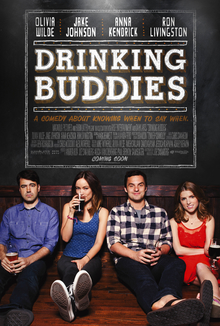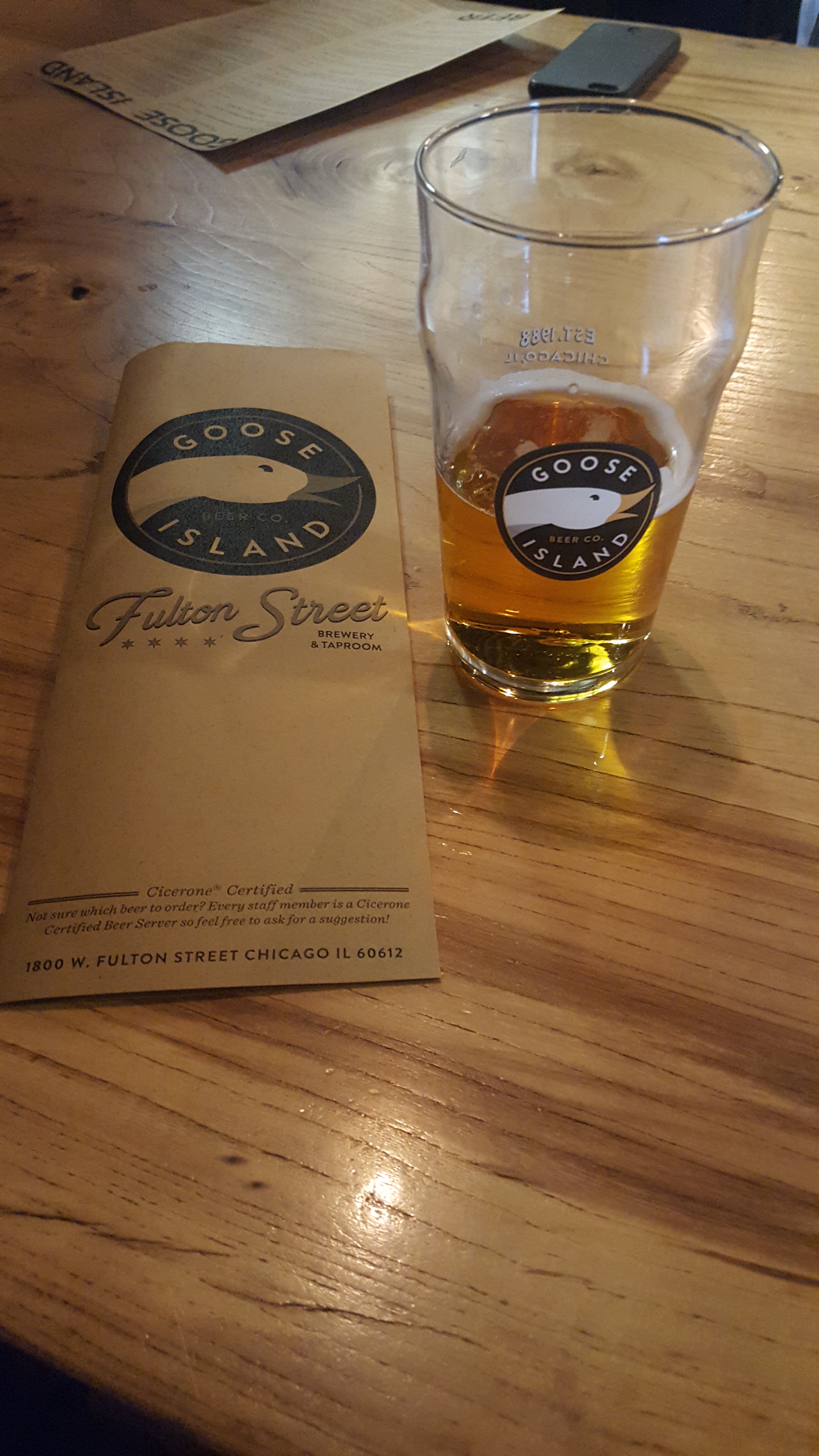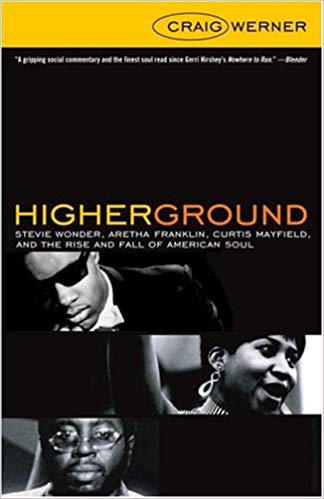Now Playing
Current DJ: DJ Duggery Presents the Frontiers of Weird
TSHA Fight from Sad Girl (Ninja Tune) Add to Collection
Requests? 773-DJ-SONGS or .(JavaScript must be enabled to view this email address)
Make a charitable donation to support CHIRP Radio and receive an amazing Thank You gift!
Welcome to The Fourth Wall, CHIRP's weekly e-conversation on cinema. This week's subject is the 2013 comedy-drama Drinking Buddies.
This edition is written by CHIRP Radio volunteers Kevin Fullam and Clarence Ewing.
 Kevin:
Kevin:
We've delved into the world of marriage in The Fourth Wall via Revolutionary Road, but I don't think we've done the same with dating and singledom? Countless hours and millions of dollars have gone into trying to figure out which sorts of people are compatible. And parsing it further, which traits are compatible. Christian Rudder turned the "science" of compatibility into a dating website (OKCupid) and later a book (Dataclysm) which revealed all sorts of interesting societal quirks that were gleaned while trying to crack this mystery.
[Something that CHIRP listeners might appreciate is the Dataclysm breakdown of musical preferences in dating profiles by race. In a finding that will likely surprise no one, there apparently ain't a band that denotes "whiteness" more than Belle & Sebastian. Ha!]
In Hollywood, the notion of compatibility has historically been rather simple. How many times have we seen partners portrayed as being completely alike... or polar opposites? "Let's draw up a man and woman who have nothing in common, and watch the sparks fly when they meet!" Though I generally get the feeling that when film and television depict already-established couples, they're often more alike than not? Steven and Elyse Keaton of Family Ties. Claire and Cliff Huxtable of The Cosby Show (uh, too soon...?). Any of the mob wives on The Sopranos. (We would expect them all to be as shallow and materialistic as their criminal husbands, and we are not disappointed.)
In director Joe Swanberg's 2013 film Drinking Buddies, we follow a pair of seemingly disparate Chicago couples. Kate (Olivia Wilde) is a free spirit who's also the marketing arm of Revolution Brewing, and she's seeing Chris (Ron Livingston), an introspective bookworm and music producer. Meanwhile, Kate's co-worker, the gregarious Luke (Jake Johnson) is a toiler on the brewery floor who lives with Jill (Anna Kendrick), a sweet, well-manicured woman who enjoys fine arts in her spare time.
Welcome to Music and Malt, a series that examines the intersections where music and beer meet in Chicago.
by Rebecca Suzan
Entries in the Music and Malt series thus far have cemented the idea that enjoying beer and enjoying music are complementary experiences. But what about the creation of both beer and music? I spoke with Tanya Kondratyuk, a scientist at Goose Island Beer Co. and a singer-songwriter, and learned that similar anxieties are involved when making these deeply personal products and releasing them out into the world.
RS: What is your role at Goose Island?
TK: I work in the lab testing quality. I check the health of the yeast and I make yeast strains bigger for use in brewing. I test batches for alcohol content, color, and haze. I make sure the beer is on schedule, fermenting properly, and that the flavors are correct. I keep an eye on transfers, which is when the beer is moved and put in tanks. I sample the bottled product and check the CO2 levels to ensure a batch hasn’t oxidized or gone bad. Running quality control is my life.
RS: Have you always wanted to work in the beer industry?
TK: It took me awhile to figure what to do with my life. Initially, I was going to be a physical therapist. I was at UIC and the plan was to get a Masters, but when I started working in a clinic, I hated it. Then, I spent two years at a tech start up. After an off-hand conversation with a friend about food and beer, I looked up schools where I could earn a degree in food science and brewing. I had two options – Urbana–Champaign or Scotland. The costs were the same and the school in Scotland was a one-year program instead of a two-year, so I chose Scotland. The end product was a Master of Science in Food Science and Brewing.
RS: Scotland, wow. So maybe a switch to whiskey is in your future?
TK: Nah. I like seeing the end product of my work sooner.
RS: I know you used to intern at Bloodshot Records. How did you get involved there?
TK: I was playing an open mic at Uncommon Ground at the time. I made it into the semi-finals of their Open Mic Competition and the prize included Bloodshot merch. Every time there was a competition, Bloodshot merch was included in the prize. I found out that was because Scott, the host of the open mic, was the manager of the label. I looked at their website and saw that Ryan Adams was on their roster, and I’m in love with Ryan Adams. I was studying at the time, but I asked Scott if the label was hiring, and I got in as an intern.
RS: Do you still perform?
TK: I played gigs before I went to Scotland, but I haven’t since I got back.
RS: What kind of music do you play?
TK: Some folk, some blues, some “indie-alternative”. I just wrote personal songs that tended not to fit in a category.
RS: What instruments do you play?
TK: I play guitar and I sing. I miss performing.
RS: What do you miss about it?
TK: It’s a good way to unwind and get everything out. Some days I feel like I’m going to explode and I need to get it out in a constructive way. I miss sharing with people. Chatting with other artists was my favorite part of open mics. What are they inspired by? What are they trying out? Artists tend to bring their rawest material to open mics, and I’m very into feelings. I’m a closed-off person, but with songs, that goes to shit. I’m a sappy songwriter. My mom always said, “Don't be afraid to talk to people.”
RS: Is it the same in the [Goose Island] lab?
TK: No, it’s the opposite. We’re very intertwined with the brewhouse and the cellar. Everything we do is to a schedule and everybody shares the same schedule. You have to be in constant communication. It gets pretty nuts. Late summer/early fall is a madhouse because Goose Island releases its Bourbon County Brand stouts on Black Friday. The production of those happens at the same time as everything else.

RS: Do you want to start performing again?
TK: I want to perform professionally. I want to tour the west coast before I’m 35. I’m convinced I’m gonna do it.
RS: What’s stopping you?
TK: Money and time. Adulting is the thing that's keeping it me from it and I hate it. I just want to travel and play music, but you have to grow up and be responsible.
RS: Is it more involved making music or making beer?
TK: Both take a lot of trial and error and inspiration from other artists and brewers. You take new ingredients and new sounds and incorporate them with existing ingredients and sounds. It’s your creation, your baby, and then you present it to the world. I remember writing my first song and making my first beer and then presenting them to people – you feel the same anxiety. There are different styles for different people. I’m a stout person - I don't like hoppy beer – and I like certain kinds of music. If I combine those two together, it’s just the best time.
RS: How would you describe your taste in music?
TK: It’s all over the place and it depends on my feelings and my mood. I grew up on Queen and The Beatles playing on my parents’ record player. In high school I was the weirdo who listened to oldies. I had a Steppenwolf sticker in my locker. I loved Three Dog Night and Creedence. I listen to Gregory Alan [Isakov], Ryan Adams, Built to Spill, Beck, the Gorillaz, and I love 80s and 90s music.
RS: Do those artists influence your own music?
TK: The slower, sappier stuff, yes. Definitely the folk artists and blues. I used to listen to a lot of The Roots. They have a bluesy rap thing going and I tried doing that for a while, but I’m not as cool as them. I have a few songs on ReverbNation and a YouTube channel that’s all covers. I like performing – it’s an adrenaline rush – but I get antsy listening to my own performances. I want to start working on a newer sound, so, away from folk, and more toward blues, like Feist. I love seeing powerful women on stage, like Alabama Shakes and tune-yards. I want my music to be a bit more upbeat and approachable. I want to write a song that people can get stuck in their heads, a song that makes people feel things.
RS: Have you encountered many women in the beer industry?
TK: Not many women are in the spotlight in the beer industry. New Glarus was founded by a woman and that gives us a leg up. At Goose Island, we partnered with Great Central Brewing, Finch Beer, and On Tour Brewing to make a guava wheat pale ale called “Kubaba Kuawa”. It was brewed by an all-female team in partnership with the Pink Boots Society. It sold well in taprooms and all the proceeds went to charity. Seeing women brew together and kicking ass was inspiring. It’s still a male-dominated industry, but I hope more female brewers come out and work together in Chicago.
RS: Is the music performance community in Chicago also a boys club?
TK: No, it’s not. At the Uncommon Ground open mics, they emphasized that it didn't matter what your background was. I’ve never seen open mics like that where everyone was there for the music and everyone was respectful. It wasn’t like a dive bar open mic. No one heckled the performers and the hosts really made it inclusive. Some bookers want more women to play because they want a good blend, especially for smaller bars where they want a different rotation for regulars.
RS: Do you see a lot of live music in Chicago?
TK: Oh yeah. Summer festivals are my jam. I go to every festival I can. I’ll take any opportunity to see live music, even if I don’t know the artist. My buddy texted me to go see a funk band I didn’t know at Logan Square Arts Fest and I jumped on the chance. It’s inspiring when you see the ideas other people bring to the table. It makes me want to go home and write [music].
RS: What’s the best show you’ve ever seen?
TK: Ok Go. They had a huge confetti gun and lasers coming out of their guitars. They even performed an entire song using Christmas bells. It was very innovative.
RS: And your favorite show?
TK: My favorite show was Gregory Alan at SPACE in Evanston. He wasn't well-known and SPACE is an intimate venue. His songs are hauntingly beautiful and his voice silences a room. There were tables with candles and a standing room area. His songs plus the specific time in my life – it gave me chills. It was exactly where I needed to be. I saw him again in Glasgow more recently. He’s gotten bigger so it was more rehearsed and clean cut, but he asked for suggestions from the crowd. I suggested his cover of John Hartford’s “In Tall Buildings”, and he played it. My heart melted.
RS: Goose Island has a strong connection to music in Chicago, presenting shows via its 312unes Series. What other connections does the company have to the music scene?
TK: Every year we open our warehouses for the Goose Island 312 Block Party. Animal Collective played last year. There are usually DJ sets and local musicians playing, too. And we always have music in taproom.
RS: Do you think there’s a natural connection between music and beer?
TK: Yes. You’ve convinced me there is. Drinking beer and listening to music are two things that bring people together.
Below you'll find a playlist inspired by my conversation with Tanya.
 by Josh Friedberg
by Josh Friedberg
Higher Ground: Stevie Wonder, Aretha Franklin, Curtis Mayfield, and the Rise and Fall of American Soul by Craig Werner
Craig Werner is one of the most perceptive music historians and critics of the last three decades, and Higher Ground—the follow-up to his highly acclaimed 1998 book, A Change is Gonna Come: Music, Race & the Soul of America—delves deeply into the work of Stevie Wonder, Aretha Franklin, and Curtis Mayfield. The book’s analysis appealed to me as a huge fan of music, history, and African American Studies, and with the passing of Aretha, now is an especially useful time to revisit the ideas in this book.